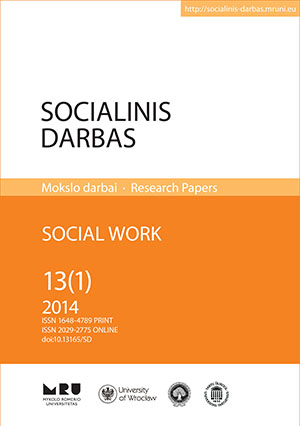Simulation game applications towards the exploration of attitudes related to the felicitary policies
Simulation game applications towards the exploration of attitudes related to the felicitary policies
Author(s): Gediminas Navaitis, Gintaras LabutisSubject(s): Social Sciences
Published by: Mykolas Romeris University
Keywords: happiness economics; felicitary policy; attitudes towards happiness; simulation games
Summary/Abstract: In recent decades among the public debates about the future trends in the society the Economy of Happiness and the Felicitary Policy (Felicity - lat. Happiness) were widely discussed. Felicitary policy is considered as the tool of the implementation of the economy of happiness. This policy is based on happiness, subjective well-being, satisfaction or dissatisfaction with life and various human life aspects. The researches devoted to those issues despite of their preciseness are rather general and summarizing. When changing the direction of the development of the Ssociety the paradigm of knowledge is in the process of inevitable change. The selection of new indicators properly reflecting Society's economic and social status is becoming more and more important. Lithuanian official statistics does not provide the statistical data on the the levels of happiness in Lithuania Society as a whole nor for specific social groups. Thus it is becoming more and more important to explore the Society‘s attitudes and perceptions towards the indicators reflecting the true reality and achieving the proper balance between them. For this purpose one can apply the of simulation models of reality in order to find the proper set of indicators. The choice of balanced indicators can be justified for the Societal needs analysis and for the future development of felicitary policy as the use of Balanced Scorecard (BSC) systems is becomig more and more applicable in public and business life. One of the proposed balanced socrecard framework for the happiness and felicitary policies includes the economic, employment, social, environmental, political, physical and mental well-being indicators. The latter balanced set of indicators of feliccitary policy was chosen as the basis for the simuliation game "Towards the happier Lithuania 2020”. The purpose of this article is to analyze and to present the attitudes towards the felicitary policy in Lithuania obtained through the simulation game mehods. The simulation game was conducted January – February, 2014 in Lithuania. Sixty five participants had attended the simulation and were the active part of the research. The outcomes of the simulation game "Towards the happier Lithuania 2020" had confirmed that the simulation games can be successfully used as the tools for proper analysis of social issues. The results had also revealed that happier future concept in Lithuanian society was primarily concerned with economic growth, employment and positive social changes. The participants of simulation game had identified and considered the society’s mental and physical health as basis of their personal development rather than the political solution. The environment and its impact on the levels public happiness were evaluated with some controversy. In addition, the simulation game participants did not associate the political matters and freedom rights with the indicators of public happiness.
Journal: Socialinis darbas
- Issue Year: 13/2014
- Issue No: 1
- Page Range: 16-27
- Page Count: 12
- Language: English

